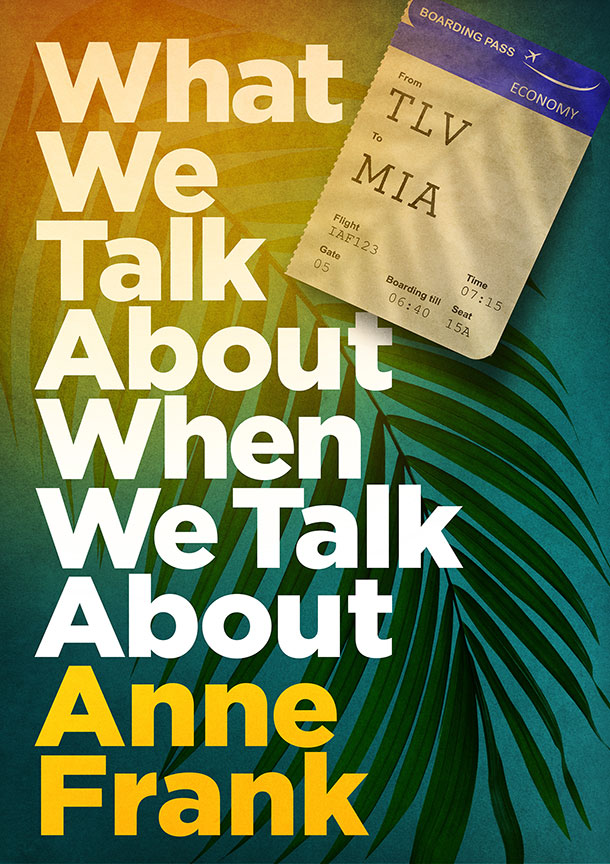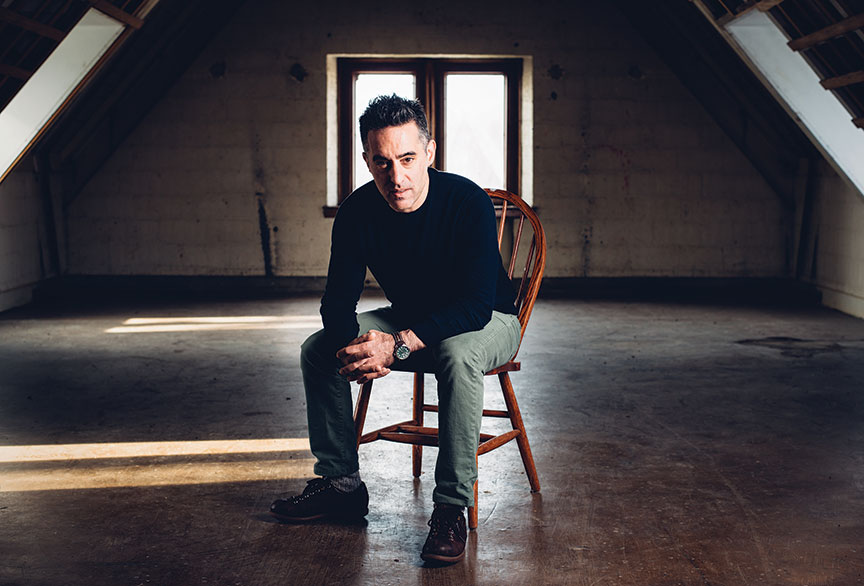Nathan Englander was raised in a conservative Orthodox family in Long Island. Little did he suspect that one day he would become a bestselling author and New York University writer-in-residence, who travels around the globe for his work.
Which makes him the kind of person people are surprised to find settling down in Toronto.
After getting over the initial shock of finding yahrzeit candles and Osem soup nuts at his local grocery store—given how in Brooklyn he’d have to take the subway to the East Village for these things—Nathan has enjoyed living amongst us Canucks for the past three dramatic years. (He even learned how to ice skate for the first time!)
He ended up north of the border because his professor wife, Rachel Silver, got a job in the education department of York University.
Even though we’re both in the same city, we spoke over Zoom. But he’s not staying for long.
Nathan explained that he’ll soon be flying to Paris for a teaching stint at the French campus of NYU. Then, after stopping back home for a quick visit, he’s off to San Diego for the premiere of What We Talk About When We Talk About Anne Frank, the stage adaptation of a short story first published 10 years ago.
Still, we covered plenty of ground, so whether or not you’re familiar with the writing of Nathan Englander here’s some tidbits worth knowing about his life and career.
Let’s start with a bit of history…
For the Relief of Unbearable Urges was Nathan’s first short story collection—published in 1999 by a major publishing house, Knopf.
It led to a level of attention that found Nora Ephron offering to take him to lunch.
The late writing legend insisted “The Twenty-Seventh Man,” a short story about a group of Jewish writers sent to prison for their alleged propaganda in Soviet Russia, was meant to be a piece of theatre. She offered to produce it herself and teach him how to write for the stage.
It was nearly a decade later, once he completed his second book, The Ministry of Special Cases, that Nathan took Nora up on her offer and added the title of “playwright” to his arsenal.
Plus, he found a kindred spirit in director Barry Edelstein, the artistic director at the Old Globe Theatre in San Diego, who has directed all of his plays to date—up to and including the next one.
Let’s learn about the play…

What We Talk About When We Talk About Anne Frank is based on the title story of his second collection of short stories.
Commissioned by the Lincoln Centre Theatre, it’s a contemporary comedy about two Jewish high school best friends who reunite as adults and discover that their lives have considerably diverged when it comes to religion, family and culture.
With a cast of five—which has yet to be announced—the play was set to premiere in the summer of 2020 and was, of course, postponed along with almost everything else on the planet.
During that period, Barry Edelstein—who acts as both director and dramaturge on the piece—had more time to develop the adaptation with Nathan, albeit on Zoom.
But being the self-proclaimed “compulsive redraftrer” that he is, Nathan sees the work as never being complete until it’s published—or in this case, until it’s before a live audience.
“I really like this notion that when something goes into the world, that’s when it’s done,” he says. “I am so excited to get to pick up a play, two years later, and rewrite it.”
In that vein, he’ll spend the next month doing rewrites before heading out west to participate in the rehearsal process, which is something that most playwrights don’t do.
Let’s find out why he isn’t making a movie…
I discovered that Nathan and I both have a stronger passion for theatre than film. In fact, he has no interest in adapting his works for the screen.
After all, rather than doing multiple takes before choosing a final version, everything is on the line with live theatre.
“I love it, I call it executing the in-executable. I love a challenge and as tight as a short story needs to be, theatre is bloodsport,” he says. “I find the form so terrifying and so transcendent, so magical.”
“I initially thought playwriting was going to take time away from my fiction. I didn’t know it was going to change me as a human being.”
Seeing his stories come to life, in front of an audience, has totally opened Nathan’s eyes to a new form of storytelling—and he’s hooked.
But to dedicated readers of his literary work, don’t despair! This writer ain’t selling his fiction soul away to the theatre world entirely.
“I don’t think I’m cheating on fiction, with theatre,” he says. “I really feel when I’m doing fiction I think, ‘There’s nothing like fiction.’ And when I’m working in theatre, I think, ‘This is the supreme form.’”
Let’s compare notes about being nomads…
Between book tours, teaching abroad and spending time in the rehearsal room, Nathan keeps himself grounded through creating routine, maintaining a positive attitude and taking necessary breaks.
“For me, it’s learning that it’s important to take a day off, like to have a Shabbat—whatever day of the week it is,” he explains. “I tell my students: writing six days a week is literally better than writing seven.”
It’s in those moments of pause where some of the best ideas come to mind for him, whether it’s in the shower or during a long walk.
Nathan also finds travel an amazing way to build a well of ideas for his creative pursuits.
He’ll spend time in a place and then a decade or two later, draw upon his experiences and write a story inspired by them.
“It’s been well more than a decade since I’ve lived out of the States and it feeds me—learning new worlds, and it feeds my work. Almost like being a spy.”
Let’s wrap this up with some Judaism…
Although his novels are seeping in Yiddishkeit, Nathan doesn’t see himself as writing specifically Jewish fiction.
“I write about people, I just tell stories.”
And between New York, Jerusalem and now Toronto, he’s lived in “such Jewish places” that it’s simply a part of his universe.
“If you build a world that is living—it’s better to have everything in it.”
What We Talk About When We Talk About Anne Frank runs from Sept. 18 to Oct. 23 at The Old Globe Theatre in San Diego.
Ilana Zackon can be reached at ilanawritesthings[@]gmail.com and found on Facebook and Instagram.
HEAR what else she has to say every week on Bonjour Chai









